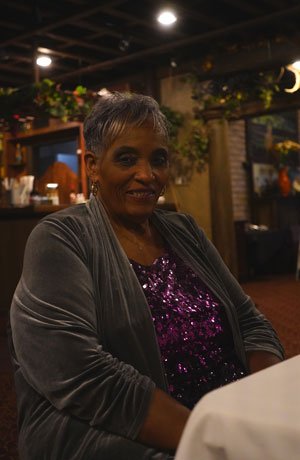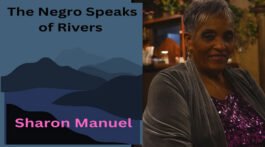In the luminous tapestry of Sharon Manuel’s musical journey, each note and chord reverberates with a rich history of passion, activism, and artistic excellence. Her latest single, “The Negro Speaks of Rivers,” is not merely a song but a testament to her lifelong dedication to both her craft and the ongoing struggle for civil rights. Sharon’s journey began in the tender years of her childhood, where the piano keys became her first companions in a lifelong symphony of vocal exploration. These early encounters with melody would soon evolve into a profound musical odyssey.
The catalyst for Sharon’s burgeoning passion was Mr. Eaton, an inspirational figure during her high school years who ignited a fervent love for singing in both Sharon and her sisters. Under his mentorship, the spark of musical passion was kindled, growing into a flame that would guide her through the turbulent 1960s—a time when music and activism were inseparably intertwined. Sharon’s college years were marked by her fervent involvement with the Student Nonviolent Coordinating Committee (SNCC), where she stood shoulder to shoulder with luminaries like Martin Luther King Jr., Coretta Scott King, Malcolm X, and Stokely Carmichael. Her voice became a powerful instrument in the clarion call for justice and equality.

Sharon Manuel
This era of social upheaval not only shaped Sharon Manuel’s activism but also honed her musical prowess. The crucible of the ’60s nurtured her voice, transforming it into a vessel of emotive resonance and social conscience. Her dedication to both music and social change bore fruit as she emerged as a revered music teacher and the lead singer at Trinity United Methodist Church. Here, her voice was not just a melody but a beacon of hope and empowerment, a testament to her unwavering commitment to her community.
The 1980s marked a significant chapter in Sharon’s narrative when she, alongside Gregory Hickman-Williams, recognized a glaring void in the classical music landscape—the absence of compositions by Black musicians. Their advocacy, supported by figures like Emmy Award winner Ben Williams, the first African American broadcaster on KPIX channel 5, paved the way for greater recognition and representation within the classical music domain. This advocacy was instrumental in illuminating a path toward acknowledging the profound contributions of Black musicians in the classical genre.
Sharon Manuel’s more recent resurgence was epitomized by the release of “The Negro Speaks of Rivers,” a single that stands as a testament to her unwavering dedication to music and social consciousness. The historical significance of her recorded performance alongside Gregory Hickman-Williams, Charlotte Nelson, and Cody Gillette in “Blacks Making History Today” on February 6th, 1983, remained obscured until its recent unveiling. This release is a powerful reminder of her enduring legacy and the timeless relevance of her work.
“The Negro Speaks of Rivers,” based on Langston Hughes’ evocative poem, is a masterful exploration of resilience, heritage, and the enduring spirit of Black identity. Hughes’s narrative, rich with lyrical finesse, traces the ancestral lineage of a Black man, tethering his existence to the monumental rivers that have sculpted his people’s history. Sharon Manuel’s rendition of this masterpiece is a tapestry of haunting resonance, her vocals imbuing the verses with an eloquent profundity that mirrors the poem’s essence.
From the onset, Hughes’s poem establishes an intimate bond between the narrator and the ancient rivers, proclaiming, “I’ve known rivers ancient as the world and older than the mountains.” Sharon’s interpretation of these lines evokes a sense of belonging entrenched in a lineage tethered to Africa’s flowing veins. The lyrical journey continues as specific rivers—the Nile, Congo, and Euphrates—are invoked, each a conduit of African history, culture, and sustenance. Sharon Manuel’s rendition echoes the multifaceted roles these rivers played: vessels of transportation, sources of life, and reservoirs of spirituality for generations of Africans.

The cover artwork
Amidst the poetic description lies a poignant reflection on ancestral strife, encapsulated in lines like “I bathed in the Euphrates when dawns were young.” These words etch a portrait of endurance and resilience, encapsulating the beauty and fortitude found amid adversity. The poem culminates with a resounding proclamation: “My soul has grown deep like the rivers.” In this declaration, the narrator’s identity intertwines with the unyielding strength of the African rivers, embodying a spirit unbroken by the trials of time.
In Sharon Manuel’s interpretation, every note, every intonation, is a deliberate homage to the poem’s essence. Her performance encapsulates the depth, emotional resonance, and unwavering belief that define the poem’s themes of heritage and resilience. Sharon Manuel’s profound engagement with the material resonates profoundly, magnifying the significance of Hughes’s powerful work.
Sharon Manuel’s recent recognition, including the MY MUSIC BLOCK TV AWARD, stands as a testament to her lifelong commitment to music and social consciousness. Her tireless dedication to both craft and cause serves as an enduring inspiration, echoing the very essence of “The Negro Speaks of Rivers”—a celebration of heritage, strength, and the enduring spirit of Black identity. Her acceptance of Gregory Hickman Williams’ MY MUSIC BLOCK TV AWARD on his behalf further highlights her deep-seated dedication to acknowledging and honoring the contributions of her colleagues and peers.
In celebrating Sharon Manuel’s illustrious career and her single, “The Negro Speaks of Rivers,” we are reminded of the profound impact of music as a vehicle for social change and the enduring power of the human spirit. Sharon’s voice, a beacon of hope and empowerment, will continue to inspire and uplift, resonating with the timeless themes of resilience and heritage that has defined her remarkable journey.
OFFICIAL LINK: https://open.spotify.com/track/4F0pd4WdnfTniB0VczMgwk?si=cce1e77e51384956














No Comment